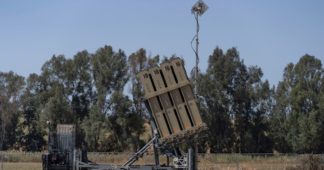An op-ed published in the Financial Times details how the recent aggression against Lebanon and the assassination of Ismail Haniyeh could send the region into war.
Jul 31, 2024
“Israel” may have sent the Middle East into a regional war following its attacks against Resistance leaders in both Lebanon and Iran, an article for the Financial Times warned.
The Israeli occupation raided a residential building in Beirut‘s Southern Suburb, Lebanon, on Tuesday evening, not only killing three civilians, including two children, but also targeting senior Hezbollah military commander Fouad Shokor. “Israel” claims Shokor has been killed, but no official word from the Islamic Resistance has confirmed or denied his alleged martyrdom.
In the few hours that followed, the head of Hamas’ political bureau, Ismail Haniyeh, was assassinated and martyred following an airstrike on his place of residence in Tehran, Iran. “Israel” has not claimed responsibility for the assassination.
According to the Financial Times, the attacks were Benjamin Netanyahu’s warning to his enemies and an assurance his settlers could reflect on following months of political turmoil and calls for his resignation.
What Benjamin Netanyahu does not realize, is that this could have possibly been the matchstick that could ignite a regional war in the Middle East.
The danger ‘Israel’ brought upon itself
An attack against Hezbollah and a clear breach of Lebanese sovereignty by “Israel”, paired with the assassination of a senior Hamas leader in Iran, have raised the stakes to new levels, signifying “Israel’s” willingness to double down on all external efforts seeking to de-escalate the situation.
FT said the region now awaits the response of Hezbollah, Iran, and the Axis of Resistance, for the attacks and in retribution for Haniyeh’s blood.
While Iran reiterated that it did not seek direct confrontation with “Israel” unless provoked, the recent breach of its sovereignty and the assassination of the martyred leader Ismail Haniyeh might be the trigger. The Islamic Republic previously showed “Israel” that a violation of its sovereignty would be met with a destructive response, as exhibited during Operation True Promise in April.
In Lebanon, “Israel” has engaged in a tit-for-tat against the Islamic Resistance and failed to deter it for the past 10 months. The recent attack against Fouad Shokor lays the ground for potential escalations the occupation has feared since October 7, when its forces launched the onslaught in Gaza and were forced into battle on several fronts against the various factions of the Axis of Resistance across the region.
The US’ ‘nightmare scenario’
“Israel” has claimed its next war with Hezbollah would have severe consequences, as it vowed to strike more than its military strongholds. However, “Israel” did suffer a “bloody nose” during the 2006 war against Hezbollah, which is now far more capable of deterring the occupation, and is a far more formidable opponent than Hamas, FT said.
In the event of a full-blown war between “Israel” and Hezbollah in Lebanon, Iran has pledged its full support to the Islamic Resistance. The author of the FT‘s op-ed speculated that the support would come in the form of mobilization of the different factions of Resistance, in Syria, Yemen, and Iraq.
This would notably mean the Axis of Resistance would overwhelm Israeli air defenses, leaving it exposed and vulnerable. This was proven to be true on multiple occasions; when Iran launched 400 missiles and drones against occupied territories and when the Yemeni Armed Forces infiltrated Tel Aviv undetected.
The United States, on the other hand, has pledged its rock-solid support for “Israel” and its defense, which could plunge it into a deeper war in the region, with its military bases in Iraq and Syria being the main targets, as well as its assets in the Red Sea.
Its efforts to de-escalate the situation have been shattered by the assassination of Ismail Haniyeh, who had been the main contributor in mediated negotiations for a ceasefire in Gaza, manifesting what the FT called a “nightmare scenario” of an exponentially escalating situation in the region.
We remind our readers that publication of articles on our site does not mean that we agree with what is written. Our policy is to publish anything which we consider of interest, so as to assist our readers in forming their opinions. Sometimes we even publish articles with which we totally disagree, since we believe it is important for our readers to be informed on as wide a spectrum of views as possible.










